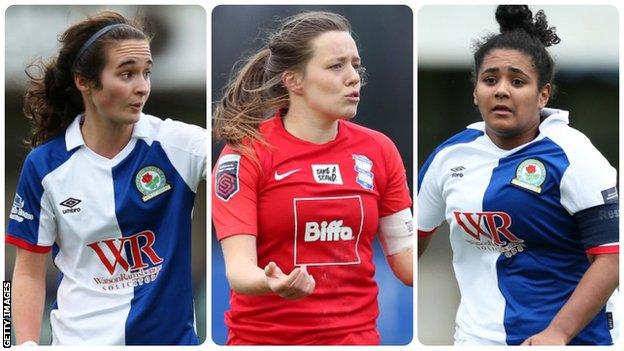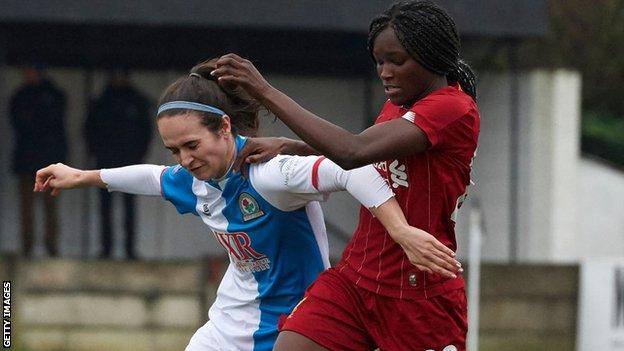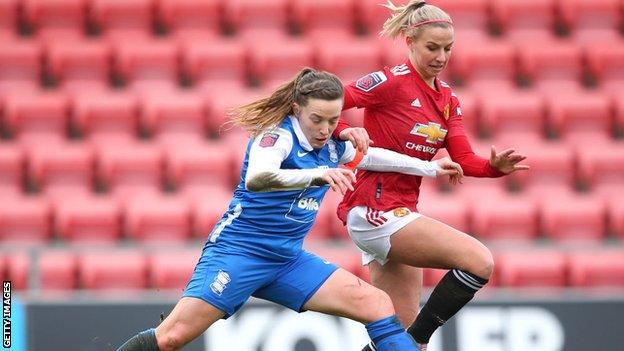Women's football: The 'juggling act' of NHS work & professional football
- Published

Blackburn's Natasha Fenton (left) and Saffron Jordan (right), alongside Birmingham City's Harriet Scott (centre) are all working within the NHS during the fight against coronavirus
Natasha Fenton, Saffron Jordan and Harriet Scott live a double life - combining football with playing their part in helping the NHS during the coronavirus pandemic.
For Blackburn Rovers' Fenton working as a physiotherapist with patients affected by Covid-19 has been a difficult experience - some days leading her to "feel like you can't go to training because you're that exhausted".
Her team-mate Jordan, who works as part of an auditing team in the critical care unit, says "you have to learn to switch off from it" and that football can be just that release.
Meanwhile, Birmingham City captain Scott is learning as she juggles her studies for a medicine degree alongside full-time football in the Women's Super League.
This is what life is like for a footballer working during a pandemic.
'There are times I feel like crying'

Natasha Fenton (left) says players in the Women's Championship make lots of "sacrifices" to play football alongside full-time work
Midfielder Fenton, 22, was swept into her job in June quicker than planned to help with the reaction to coronavirus.
Since then it's been "a whirlwind" as she continues to help patients with chest therapy and improving mobility in her role as a physiotherapist.
"My day consists of seeing as many patients as I can - giving them rehab - but also seeing the sad side of it where some patients don't make it through," Fenton told BBC Sport.
"You have to be those family members for those patients. That's been the most difficult aspect."
Fenton, who is one of many in the Championship working full-time alongside football, says it is not always easy to switch off at training and "the outcome is probably determined by how my day at work has been".
"Sometimes I won't even think about work when I'm at football. But I have noticed my emotions are heightened. If I make a bad pass or make the wrong decision, those feel a lot worse than they actually are," she added.
"There are times when I do feel like crying whereas if it had been a normal day, I would have just got on with it. The things I have seen have changed my outlook and probably changed me as a person. It's something I am learning to manage."
Ultimately, however, Fenton says it is "the tiny little wins that make me realise why I love the job.
"I feel proud every day to put on my uniform".
'We just all get on with it'
Rovers captain Jordan, 27, who has worked in the NHS since 2016, deals with data regarding mortality rates and coronavirus cases.
She says she will look back on the "small part I played when we were struggling" and that the experience has been intense but rewarding.
Jordan, who says football gives her something else to focus on admits, like Fenton, there are times it has been challenging.
"I tell everyone to avoid me on Thursdays because that's the third day and I'm just like 'nope'. I get there, train, and then go home, I don't have the energy for it," she told BBC Sport.
"The club are always supportive though. The coaches are aware of who is working full-time and they understand if you are feeling a bit low. They take that into consideration.
"You put everything into the moment and realise how lucky we are that we are actually allowed to go out and play football."
Scott's 'juggling act' and degree

Harriet Scott (left) is able to study for a medicine degree at Keele University while playing full-time football with Birmingham City in the WSL
Birmingham's Scott, 28, relies on support from the club to deal with the juggling act of studying a medicine degree during the pandemic, while playing top-flight professional football.
Manager Carla Ward does extra training sessions with her and the club's strength and conditioning coach helps her maintain her fitness levels.
Scott says it is important for her to have another focus outside of medicine to avoid going "stir crazy".
Scott admits it has been difficult dealing with patients with coronavirus, as well as those struggling with mental health.
"People are being triggered a lot easier, or they have a lot more stress, because it's a very difficult time for everybody," she said.
"We meet patients and help nurses and doctors when we can but obviously it's very busy at the moment so it's a different environment than what it should be normally for us.
"We're trying to help without being a hindrance but also trying to learn - so it's difficult."
But Scott says she is "really glad I'm doing the job I'm doing" during a time when so many are coming together for the same cause.